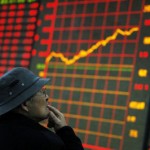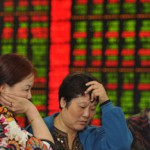China Stocks Drop Despite Inflation Data

Large swings in Asian markets persist over worries about U.S. rate increase, China’s economy
China-style volatility spread to Japan stocks Thursday as the Nikkei Stock Average reversed its previous-day surge, leading the region lower. China stocks fell even as Chinese consumer inflation rose more than expected, suggesting demand has stayed strong in the world’s number-two economy.
The Nikkei Stock Average dropped 3.8%, reversing a 7.7% jump from the previous day that had been its biggest daily gain in nearly seven years.
Asian shares elsewhere fell too, including the Shanghai Composite Index which declined by 0.9%.
Chinese shares came off their morning lows, after official data showed China’s consumer inflation accelerating in August, rising 2% from a year earlier, compared with a 1.6% rise in July. Economists had expected a 1.9% gain.
“Despite the pickup, the CPI figure still isn’t a threat for Beijing to change its policy stance, especially when factory-gate prices remain in deflationary territory. China’s central bank is expected to keep easing its monetary policy throughout the year,” Fan Zhang, an economist with RHB Research said.
Still, declines across the region Thursday extend a series of swings over the past week, with two uncertainties prevailing in markets: the U.S. Federal Reserve’s next move on interest rates and China’s ability to shore up its market.
The Shanghai market fell in June and plunged further in August, as Beijing’s devaluation of the yuan sparked a global stock swoon on worries that China’s government is struggling to meet economic-growth targets. Since then, markets have struggled to rebound from last month’s lows. While China’s market has gained since late August, the Nikkei, now near its lowest levels since February, has turned increasingly volatile.
On Wednesday, the Nikkei surged as a rally in China and bullish comments from Japanese Prime Minister Shinzo Abe triggered a squeeze on short positions. But overnight losses in U.S. pressured Asian markets. The S&P 500 lost 1.4%, with traders saying that back-and-forth action is likely to continue at least until the Federal Reserve’s interest-rate decision next week.
“You’re going to have these whippy markets” in the short term, said Chris Weston, market analyst at IG. “People are questioning whether the [recent] rally was a byproduct of a genuine change in sentiment.” For now, he said it looks like the rally was mostly due to short covering.
On Thursday, Japan shares returned to losses, despite comments from Bank of Japan Governor Haruhiko Kuroda saying the government will continue with its current easing-program until inflation stabilizes at 2%. He said that inflation may not reach that level until around autumn next year, depending on oil prices.
Australia’s S&P ASX 200 was down 2.3%. Australia’s unemployment rate fell to 6.2% in August from 6.3% in July, in line with what economists surveyed by The Wall Street Journal had been expecting.
South Korea’s Kospi was off 0.5%.
Shares in New Zealand were flat after the Reserve Bank of New Zealand cut its key interest-rate Thursday as expected and left the door open to further easing.
The U.S. dollar traded as high as 4.3750 Malaysian ringgit. The ringgit is down by about a quarter this year.
The Australian dollar fell 0.6% against the U.S. dollar, while the South Korean won fell 0.4%, both trading near multiyear lows.
In China, stocks were lower despite signs that the government wants to step up fiscal stimulus. China’s Ministry of Finance earlier in the week that the country would roll out a “more forceful” fiscal policy to stimulate economic growth, which it said faced downward pressure.
The Shanghai Composite Index has gained more than 5.3% in the past two sessions, but many analysts attribute the gains to government-led buying.
Source: WSJ – China Stocks Drop Despite Inflation Data




























